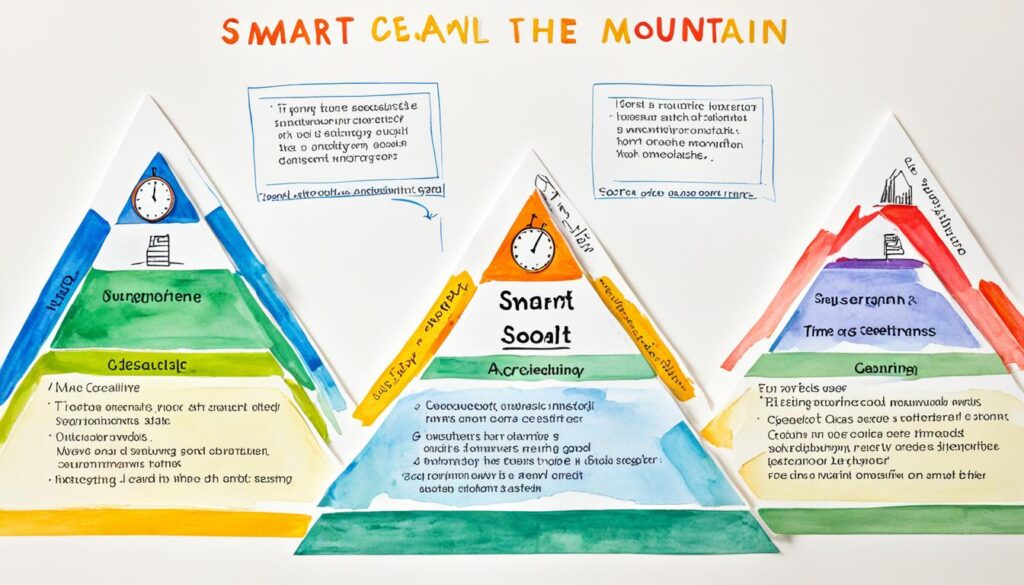Unlock Success: Purpose of Goal Deadlines Explained

Have you ever wondered why setting a deadline for your goals is so important? What is the purpose behind it? Is it just a matter of adding pressure or does it serve a deeper purpose in goal achievement? Let’s delve into the significance of goal deadlines and how they can unlock your path to success.
Key Takeaways:
- Setting clear and meaningful goals is the first step towards achieving success.
- Deadlines create a sense of urgency and motivate individuals to take action.
- Specific and challenging goals with deadlines lead to enhanced performance in 90% of cases.
- Goal deadlines instill discipline, encourage prioritization, and ensure a steady pace towards achievement.
- By setting SMART goals, you can amplify focus, productivity, and goal attainment.
The Power of Perspective in Setting Goals
Perspective is a powerful force when it comes to goal setting. It acts as the lens through which we view the world and ourselves, shaping our desires and influencing our actions. Our personal history, experiences, values, and beliefs all contribute to our unique perspective, making it essential to consider when setting goals.
When it comes to setting goals, there are two main types to consider: subjective goals and objective goals.
- Subjective goals are deeply personal and hold immense meaning for an individual. They align with values, passions, and aspirations, allowing for a sense of fulfillment and purpose in the pursuit of these goals. Subjective goals are driven by individual perspective and reflect what truly matters to you.
- Objective goals, on the other hand, are universally recognized benchmarks of success. They are often influenced by societal expectations, industry standards, or external measures of achievement. Objective goals provide a clear path to follow and allow for comparison and validation by others.
Both subjective and objective goals have their own merits, but it is crucial to understand and align them with your personal perspective. By setting goals that resonate with your values and aspirations, you create a meaningful framework for your journey towards success.
It is important to note that the relevance of your goals should not be overshadowed by external pressures or societal expectations. Your perspective and what matters to you should always be at the forefront of your goal-setting process. By setting goals that align with your personal perspective, you are more likely to stay motivated and committed throughout the journey.
Example:
Let’s say you have a passion for environmental sustainability. Your subjective goal could be to reduce your personal carbon footprint by 50% within the next year. This goal reflects your values and aspirations and aligns with your perspective on the importance of preserving the planet. On the other hand, an objective goal in this context could be to obtain a recognized certification in sustainable practices, which can demonstrate your commitment to environmental responsibility to others.

Remember, in goal setting, perspective is a guiding light that shapes your aspirations and the actions you take to achieve them. Embrace your unique perspective, align your goals accordingly, and embark on a fulfilling journey towards success.
The SMART Approach to Goal Setting
Setting clear and attainable goals is crucial for success. To ensure your goals are focused, motivating, and achievable, it is essential to follow the SMART approach. SMART stands for Specific, Measurable, Achievable, Relevant, and Time-bound.
Specific goals provide clarity on what needs to be accomplished. By defining the desired outcome in a detailed and precise manner, you can eliminate ambiguity and ensure a clear path forward.
Measurable goals allow for tracking progress and success. By establishing concrete metrics or milestones, you can objectively measure your achievements and stay motivated throughout the journey.
Achievable goals are realistic and within your reach. Setting goals that are too ambitious or unrealistic can lead to frustration and demotivation. It’s important to challenge yourself while also considering your abilities and available resources.
Relevant goals align with your values, aspirations, and long-term objectives. When your goals have personal meaning and relevance, you will be more invested in their attainment and find greater fulfillment in their accomplishment.
Time-bound goals have a defined timeline for completion. By setting deadlines, you create a sense of urgency and accountability, which enhances focus, productivity, and goal achievement.
By incorporating all these elements – Specific, Measurable, Achievable, Relevant, and Time-bound – into your goal setting process, you increase your chances of success and make your journey more purposeful.
Benefits of the SMART Approach
The SMART framework brings numerous benefits to goal setting:
- Enhanced focus: By setting specific goals, you have a clear direction and can focus on the necessary actions.
- Increased motivation: Measurable goals provide a sense of progress and accomplishment, fueling your motivation along the way.
- Improved organization: SMART goals require careful planning and organization, ensuring you stay on track and manage your time effectively.
- Higher success rate: Achievable goals set you up for success by considering your capabilities and available resources.
- Greater alignment: Relevant goals ensure that your actions are in line with your values and long-term objectives, creating a more meaningful journey.
- Time management: Time-bound goals instill a sense of urgency and help you prioritize tasks, enabling you to make the most of your time.
Adopting the SMART approach to goal setting will empower you to effectively plan, track, and achieve your goals, turning your aspirations into reality.

| SMART Element | Description |
|---|---|
| Specific | Goals should be clearly defined and focused. |
| Measurable | Goals should include quantifiable criteria for tracking progress. |
| Achievable | Goals should be realistic and attainable based on your resources and capabilities. |
| Relevant | Goals should align with your values, aspirations, and long-term objectives. |
| Time-bound | Goals should have a deadline or timeline for completion. |
How to Write and Apply SMART Goals
Writing SMART goals is a step-by-step process that helps you set clear and achievable objectives. By following this guide, you can ensure that your goals are specific, measurable, achievable, relevant, and time-bound.
- Start with a general idea: Begin by identifying a general area or aspect of your life that you want to improve or achieve something in. This can be related to personal development, career, education, health and fitness, or any other area that is important to you.
- Narrow it down to a specific objective: Once you have a general idea, define your goal in a specific and precise manner. This will help you focus your efforts and make it easier to track your progress.
- Make it measurable: It’s important to establish criteria for measuring your goal’s progress and success. This could involve setting specific targets, milestones, or metrics that you can track over time.
- Assess achievability: Take a realistic look at your goal and evaluate whether it is achievable given your current resources, skills, and circumstances. It’s important to set goals that are challenging but within reach.
- Check relevance: Ensure that your goal aligns with your values, aspirations, and long-term objectives. It should be meaningful and contribute to your overall growth and fulfillment.
- Set a deadline: Give your goal a specific timeline for completion. A deadline creates a sense of urgency and provides focus and motivation.
By following these steps, you can effectively write and apply SMART goals that propel you towards success.
Examples of SMART Goals
| Area | Sample SMART Goal |
|---|---|
| Personal Development | Complete a leadership course within six months to enhance my communication and decision-making skills. |
| Business | Increase revenue by 15% in the next quarter by implementing a targeted marketing campaign and improving customer retention strategies. |
| Education | Finish reading five books on personal finance within three months to gain a better understanding of financial management. |
| Health and Fitness | Exercise for at least 30 minutes, five days a week, for the next three months to improve cardiovascular health and increase overall fitness levels. |
These examples illustrate how SMART goals can be applied across different areas of life, serving as a guide for your goal-setting journey.

Conclusion
Setting clear goals and implementing deadlines is essential for your journey towards success. Deadlines play a crucial role in providing a sense of urgency, discipline, and motivation, pushing you to take consistent action towards achieving your goals. By adopting the SMART approach to goal setting – creating goals that are specific, measurable, achievable, relevant, and time-bound – you enhance your focus, productivity, and ultimately, your chances of attaining your desired outcomes.
Aligning your goals with your personal values and aspirations is key to creating a meaningful and fulfilling journey. When your goals are deeply connected to who you are and what you genuinely want to achieve, the path towards success becomes more enjoyable and purpose-driven. So, start setting SMART goals today and unlock the pathway to realizing your dreams and aspirations.
Remember, success is not just about reaching the destination but also the satisfaction and growth you experience along the way. By setting clear goals, embracing deadlines, and utilizing the SMART framework, you are equipping yourself with the tools and mindset needed to navigate the challenges and seize the opportunities that come your way. Take control of your future, embrace the power of goal setting, and embark on a transformative journey towards the life you envision.






